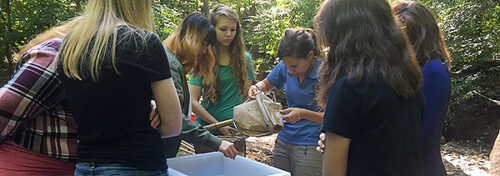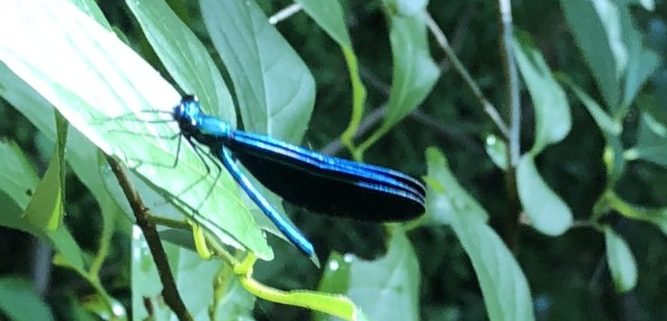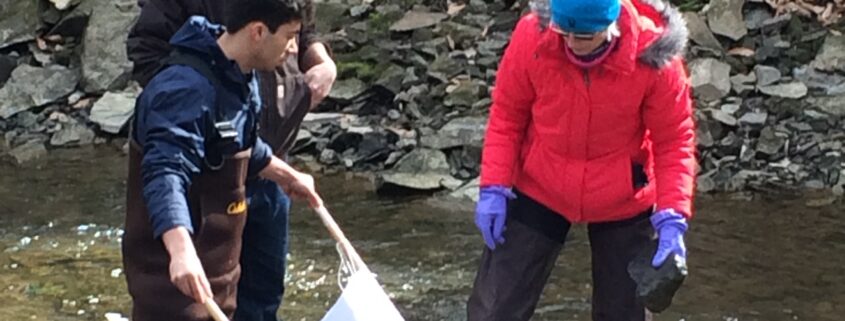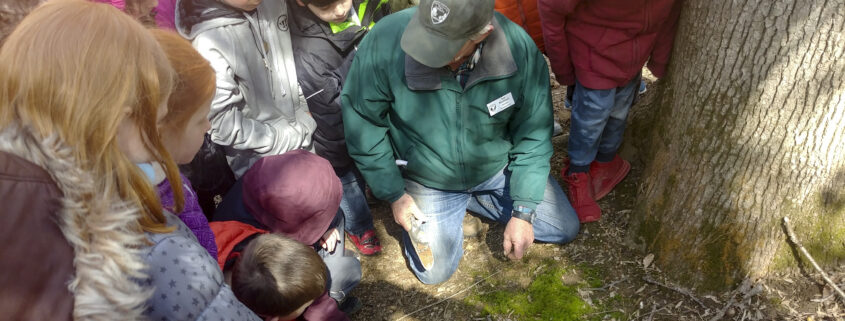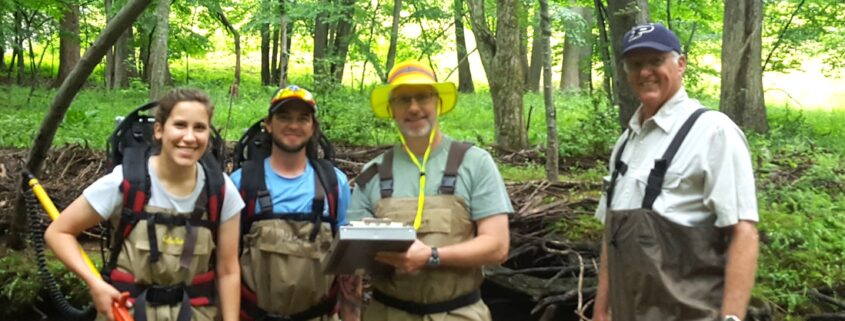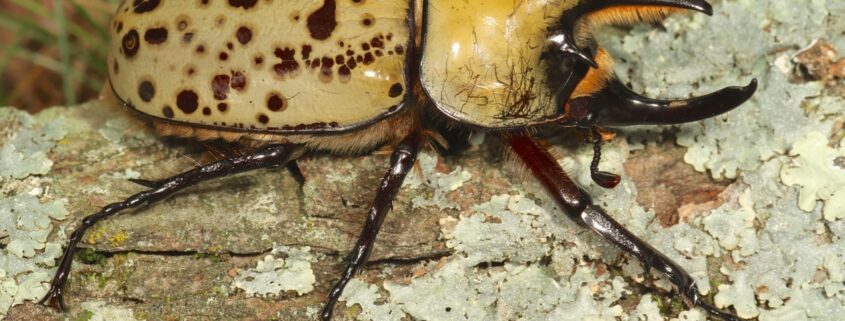Posts
Revitalize, Restore, Replant (R3) seeks volunteers
/in News and Updates, Volunteer Opportunities/by vmnfairfaxFairfax County Stormwater division is seeking plant-knowledgeable volunteers (on a one-off or recurring basis) to help thin/weed native plant gardens installed on school properties around the county through their “Revitalize, Restore, Replant! (R3) program“.
Each school’s garden has been documented with the species planted, and your skill comes in to help remove plants that aren’t those desirable plants as well as to thin natives that have made the garden look “messy”. Volunteers can work with Stormwater to even take some natives home, if that is of interest. Additionally, if you know of better species that you’d recommend for a certain garden, suggestions are welcome! The spreadsheet (R3 Plantings and Survivorship) has school names, locations (city/zip), and types of plants included to make the task even easier.
How often would you need to visit? Overall, it would be great to get volunteers (not necessarily the same one) to visit each garden 3-4 times a year, with a few times during the growing seasons and then a March visit to help prep the site for spring growth.
If you’re interested in helping one-off or on a recurring basis, please contact watersheds@fairfaxcounty.gov.
This project qualifies for service hours as Project S224, Stewardship projects for Fairfax County Public Schools.
Butterflies and dragonflies at Walker Nature Center, July 18, 20, 25, 27
/in Learning Opportunities, News and Updates, Volunteer Opportunities/by vmnfairfaxButterfly Class: An Introduction
July 18
7:00-8:30 PM
Reston, VA Vernon Walker Nature Center
Butterfly count July 20
Discover the colorful and diverse lives of Reston’s “flying flowers.” Learn how to identify Reston’s common butterflies and get a basic introduction to their life history. This class is a great way to prepare for the Reston Butterfly Count.
Register by July 15. Free for participants in July 20 count, otherwise $5. (Click on Nature, then scroll down for Walker Nature Center and scroll to Wildlife Counts and Classes.)
Dragonfly Class: An Introduction
July 25
7:00-8:30 PM
Reston, VA Vernon Walker Nature Center
Dragonfly count July 27
Discover the fast and fascinating lives of Reston’s “flying dragons.” Learn basic identification, natural history and conservation of local dragonflies. Learn to identify Reston’s common dragonflies and get a basic introduction to their bizarre behavior and complex history.
Register by July 22. Free for participants in the July 27 count. (Click on Nature, then scroll down for Walker Nature Center and scroll to Wildlife Counts and Classes.)
NVSWCD stream monitoring workshops and sessions
/in News and Updates, Volunteer Opportunities/by vmnfairfaxReston Association Stream Monitoring Workshop
When: Saturday, July 13, 8:00-11:00am
Where: Reston VA
Spring is here and the warm weather is creeping back. What better way to enjoy the changing seasons than to get your feet wet in one of Reston’s streams? RA welcomes new volunteers to assist with stream monitoring at several locations. Get involved with a small team to collect data and identify insects with the goal of assessing the health of Reston’s streams. Not only do you get to learn about streams, it also provides an opportunity to make new friends! Learn more and register.
Pope’s Head Creek Stream Monitoring Session
When: Saturday, July 13, 9:00am-12:00pm
Where: Old Colchester Rd., Fairfax Station VA
Please join us at this lovely site where we can drive right up to the stream bank. No experience necessary. Find details here. RSVP to Margaret here.
Little Pimmit Run Stream Monitoring Workshop
When: Saturday, July 13, 10:00am-12:30pm
Where: Off Maddux Lane, McLean, VA
Join NVSWCD as we discover aquatic life in Pimmit Run! This official NVSWCD stream monitoring workshop covers watershed health, what macroinvertebrates tell us about stream quality, and what you can do to prevent pollution in your local stream. This workshop will also help to prepare you to become a certified stream monitor, and is the last NVSWCD workshop before the certification workshop in August. Registration is limited. Send questions to Ashley Palmer and RSVP here.
Lake Accotink Stream Cleanup
When: Sunday, July 14, 9:00-11:00am
Where: Lake Accotink Park, Springfield VA
* Lake Accotink Trail entrance at Ellet and Inverchapel Road
* Lake Accotink Marina
* Lake Accotink Trail entrance at the end of Danberry Forest Drive (Kirkham and Uxbridge Court Playground
Meet at one of the above locations, pick up trash bags from the volunteer lead, and hit the trail to fill your trash bags with debris. Long sleeves, gloves, boots, and long pants are encouraged. Learn more on the Friends of Accotink Creek calendar.
Broad Run/Dawkin’s Branch Stream Monitoring Session
When: Saturday, August 3, 10:30am-12:30pm
Where: Bristow, VA
Parking is in the upper parking lot of Victory Lakes Elementary School parking at 12001 Tygart Lake, Bristow VA 20136. Follow signs near the playground to the Broad Run trail near the kiosk area. Join Sonnie Coffey at this beautiful adopted outdoor learning site for more water quality awareness in Prince William County. You’re invited to come learn more about benthic invertebrates and how they can determine the water quality of a stream. For more information and RSVP, please contact Sonnie Coffey.
Reston Association Stream Monitoring Workshop
When: Wednesday, August 14, 1:00-4:00pm
Where: Walker Nature Center, Reston VA
Summer is here and the warm weather is creeping back. What better way to enjoy the changing seasons than to get your feet wet in one of Reston’s streams? RA welcomes new volunteers to assist with stream monitoring at several locations. Get involved with a small team to collect data and identify insects with the goal of assessing the health of Reston’s streams. Not only do you get to learn about streams, it also provides an opportunity to make new friends! Learn more and register.
Reston Association Stream Monitoring Workshop
When: Saturday, August 24, 8:00-11:00am
Where: Reston VA
Summer is here and the warm weather is creeping back. What better way to enjoy the changing seasons than to get your feet wet in one of Reston’s streams? RA welcomes new volunteers to assist with stream monitoring at several locations. Get involved with a small team to collect data and identify insects with the goal of assessing the health of Reston’s streams. Not only do you get to learn about streams, it also provides an opportunity to make new friends! Learn more and register.
NOVA Stream Monitor Certification Workshop
This event is jointly organized by the Northern Virginia Soil and Water Conservation District and the Prince William Soil and Water Conservation District and is open to anyone aspiring to become a Certified Stream Monitor.
Once certified, a monitor can adopt a stream site to monitor quarterly. The certification/training follows the Virginia Save Our Streams (SOS) monitoring protocol and the data collected is sent to the Department of Environmental Quality (DEQ).
All certified monitors are also invited to seize this opportunity to meet with the Chesapeake Monitoring Council Coordinator for new monitoring meters or get old meters calibrated.
To register and for more information,
please contact Veronica Tangiri (Prince William) or Ashley Palmer (Fairfax)
Project Confluence Webinar, July 23
/in Learning Opportunities, News and Updates, Volunteer Opportunities/by vmnfairfaxDo you want to know what engineering and scientific skills and resources are ready to be mobilized in service of communities? Are you curious about the kinds of incentives and barriers that might exist to collaborative work with communities? Are you interested in learning about how engineers and scientists value collaborations with communities?
Tune into Project Confluence Webinar 2 on July 23rd, 2019 at 11am PT/2pm ET held by re-Engineered at Arizona State University to hear more about our research findings from a national survey of engineers and scientists interested in community–based work (Project Confluence) and find out how to get involved. This webinar is meant for anyone—including working professionals, community leaders, government officials, students, and academics—who cares about promoting engineering and science that serves public need.
This is the second in a series of webinars re-Engineered will host that aim to highlight opportunities for collaboration between community groups, engineers, and scientists to address environmental, climate, and energy concerns. You can view our first webinar here: https://www.reengineered.org/projectconfluencewebinar
DATE: July 23rd, 2019 (Tuesday)
TIME: 2pm Eastern / 11am Pacific
DURATION: 1 hour
REGISTER HERE: https://asu.zoom.us/webinar/register/WN_3nrMTIxWSF650vqbQ99prQ
A recording of the webinar will be made available at reengineered.org/projectconfluence within 24 hours in case you cannot make the live webinar.
ABOUT US: We are a group of interdisciplinary researchers (engineers, planners, and social scientists) at Arizona State University focused on building the technical capacity of environmental, climate, and energy justice groups across the US. As a first step in our work, we are talking to communities to see what technical resources are needed to meet their goals. You can find out more about our work at reengineered.org.
HOW TO GET INVOLVED: If you are a community group or non-profit, engineer or scientist, that wants to get involved with Project Confluence, please reach out to us! You can contact us with any questions, comments, or ideas at darshan.karwat@asu.edu (re-Engineered’s lead), anthony.levenda@asu.edu (post-doctoral fellow), or reengineeredlab@gmail.com (re-Engineered’s group email). You can also follow us on Twitter @reengineeredlab.
(If you belong to FMN and want credit, be sure to add this project to the CE calendar)
Riverbend Park: A story of abundant opportunities to volunteer
/in News and Updates, Success Stories, Volunteer Opportunities/by vmnfairfaxTom Blackburn
When I graduated from the Master Naturalist training program about five years ago, Riverbend Park was the first place I looked for volunteer opportunities. Although I volunteer with other parks and organizations, Riverbend has long been my favorite place to work. Over the years, I have helped with kayak trips, astronomy programs, Bluebell Festivals, Native American Festivals, summer camps, scout merit badges, educational hikes, and trash cleanups. I even created and led “Moonshine and Mayhem” hikes, with guidance from Park staff, during which I interpreted the history of the park during the Prohibition Era. But my most rewarding time at the park has been as a School Programs Lead Volunteer (E 110).
Riverbend hosts numerous classes of second through fourth graders who come to learn about the park’s natural resources, Native Americans, ecology, and the environment. School Programs Lead Volunteers have a unique opportunity to open students’ eyes and imaginations to the natural world and the cultural history of the area. Grade school students have a sense of wonder and excitement about the world that inspires me every time I lead a class. Their enthusiasm as they learn to shoot a bow and arrow, figure out why sand is deposited along a trail, squeal over frogs and snakes, or learn life cycles of animals and plants always leaves me even more energized after the class than when I begin it. I end each session convinced that I benefited from the class at least as much as the students.
Working at Riverbend is particularly enjoyable because of the park’s welcoming and appreciative staff. Rita Peralta, the Natural Resources Manager; Jordan Libera, the Senior Interpreter Program Manager; Valeria Espinoza, the Volunteer Coordinator; Julie Gurnee, the Visitor Center Manager; and the Interpreters are all committed to their tasks and a pleasure to work with.
Numerous other FMNers have found Riverbend to be a rewarding place to volunteer. To name just a few, Kris Lansing and Robin Duska lead bird walks (C106); Nancy Yinger, Jean Skolnick, Jerry Peters, Doreen Peters, and Janice Meyer conduct citizen science surveys of wildflowers, salamanders and dragonflies (C106); and Marilyn Kupetz provides care for the park’s animals (S182). Other FMNs have helped with eliminating invasives and planting native plants at the park.
It’s easy to begin volunteering at Riverbend. Valeria Espinoza coordinates volunteers and sends periodic messages about volunteer opportunities. If you contact her at valeria.espinoza@fairfaxcounty.gov, she will tell you how to get on her list. And the Park is accepting applications for School Programs Lead Volunteers through September, at https://volunteer.fairfaxcounty.gov/custom/1380/#/opp_details/179279.
Come volunteer at Riverbend–you’ll be glad you did!
Fairfax Master Naturalist earns Reston’s 2019 55+ Volunteer of the Year Award
/in Learning Opportunities, News and Updates, Success Stories, Volunteer Opportunities/by vmnfairfaxDon Coram
On April 18, I received the Reston Association 2019 55+ Volunteer of the Year Award. This surprised me since, although I am a certified Virginia Master Naturalist in the Fairfax Chapter, and my volunteer work was related to insects, my career was in mathematics. So how did I end up getting an award for service related to insects? Here is the story.
The Volunteer Reston Service Awards aim to recognize all of Reston’s volunteers and to distinguish a few volunteers who have gone above and beyond to support Reston Association (RA) and the Reston community. As a volunteer, I have been working to fill voids in Reston’s nature program, specifically related to insects and other arthropods. Insects may seem to be insignificant, but there are increasing alarms in the scientific community about the decline of insect populations and the negative effects to life on earth, including humans.
One of the global issues is whether seasonal activity of plants, insects and birds are all responding synchronously to climate change. This issue is being addressed by CaterpillarsCount!, a National Science Foundation-funded study with lead universities of University of North Carolina, Georgetown University, and University of Connecticut. Reston’s Walker Nature Center (WNC) is one of the 73 sites in the Eastern United States. Georgetown University approached the WNC seeking volunteers to collect data. WNC in turn contacted the FMN members in Reston to ask for volunteers. I volunteered and became the lead citizen scientist data collector for WNC site. The project required weekly surveys of caterpillars and other arthropods, in accordance with a strict scientific protocol, throughout the season. A colleague from Georgetown and I briefed the results in an FMN-recognized program at the WNC on April 23.
Another challenge that I accepted was publicizing the bee kill in Reston. I also informed the Reston Association Board of Directors, briefed the Fairfax County Environmental Quality Advisory Committee, notified the Environmental Protection Agency, and contacted the Xerces Society, the national society for invertebrate conservation.
I have participated in Reston’s Dragonfly Counts for many years and was recently promoted to instructor for the preparatory class and leader for the counting teams. (The class and the counting are FMN continuing education and service activities, E252 and C171, respectively.) The original instructor on dragonflies in Reston moved away several years ago, so I volunteered to take over this project. Similarly, I led both teams surveying dragonflies in the 2018 Reston BioBlitz, when the leader of one of the teams was unable to participate.
I have also volunteered in Reston surveys of butterflies and birds (FMN continuing education and service projects, E250, C171, and C248). In fact, my volunteering began years ago with birds, continued to butterflies, and now includes dragonflies and caterpillars.
I used the data gathered on butterflies, dragonflies, native bees, and caterpillars to author the invertebrates section of the Reston Annual State of the Environment Report (RASER), yet another FMN service project: C245. In the first edition of RASER, I contributed to several other sections, but observed that these sections were well-covered by the RASER working group, except for invertebrates. Thus for the second edition, I focused on invertebrates as the sole author.
For each of the above projects, I volunteered time and expertise to photograph the subjects. For example, all of the photographs I used in the identification section of the Reston Dragonfly Class were taken in Reston. I believe that amateur photographs taken locally are easier for students to relate to than professional photographs in field guides covering a wide, unfamiliar area. I also submitted many of these photographs to iNaturalist and BugGuide.
The activities discussed above illustrate success in meeting the FMN goal “to provide education, outreach and service for the beneficial management of natural resources and natural areas in the Fairfax County area”. I first learned about FMN at the Spring Festival at the WNC in Reston.
So the answer to the question of how a mathematician became a volunteer entomology awardee is the Fairfax Master Naturalist program.
I welcome your participation in any of the projects I support.
Volunteer Reston honors Doug Britt for community service
/in News and Updates, Success Stories, Volunteer Opportunities/by vmnfairfaxDoug Britt was honored as one of two 2019 Volunteers of the Year, for his efforts to guide Reston into becoming a member of the Biophilic Cities Network. In 2018, Reston officially became the 13th partner community, joining such biophilic cities as Singapore; Sydney, Australia; Wellington, New Zealand; Oslo, Norway; Edmonton, Canada; Portland, San Francisco, Austin, and Washington, DC. The successful application to join this prestigious Network came about as a result of a recommendation made by the Reston Annual State of the Environment Report (RASER) Working Group, led by Mr. Britt. The RASER Working Group was established by Reston Association’s Environmental Advisory Committee in 2017. It was charged with the task of assessing and documenting the environmental conditions of the community to establish a baseline against which future changes could be measured. Doug served alongside five other Fairfax Chapter VMN program graduates: Don Coram (who won the 2019 Volunteer Reston 55+ Volunteer Award), Robin Duska, Linda Fuller, Lois Phemister, and Claudia Thompson-Deahl, all of whom helped prepare the RASER.
The first RASER was published in July 2017. It evaluated 16 separate environmental attributes of the Reston community, concluding with a postscript arguing that Reston is a biophilic community by design and intent of its founding principles. Reston’s particular way of connecting its natural areas to its residents (through its many walking paths, trails, Nature Center, recreation areas, and education/outreach programs) maximizes such connectivity and promotes more frequent, longer duration, and more immersive interactions, while the preservation of Reston’s green spaces also creates healthy viewscapes from much of the built environment.
The current RASER was completed by the Working Group in November 2018. The report updates and expands upon the first RASER. The 2018 report evaluates the status of the following environmental attributes: Air Quality, Streams, Lakes & Ponds, Stormwater Management, Drinking Water, Wastewater Treatment, Urban Forests, Meadows, Wetlands, Landscaping & Urban Agriculture, Birds, Mammals, Reptiles & Amphibians, Invertebrates, Wildlife Management, Hazardous Materials & Toxic Wastes, Light Pollution, Noise Pollution, and Education & Outreach.
All together, the Working Group analyzed and reviewed more than 325 data sources and scientific reports during the summer and fall of 2018 by the Working Group. Each environmental attribute was then given a qualitative status using a traffic light icon to distinguish between “good”, “fair”, “poor”, or “undetermined”. The last designation indicates that not enough data exist to make a reasonable assessment at this time. The full report includes 135 graphs, tables, maps and photos, along with a complete list of references for readers interested in more detailed information. The current report also expands on each environmental attribute analyzed by including information about how each attribute relates to Fairfax County’s current Environmental Vision document (something that was not included in the earlier 2017 RASER).
Another addition to the current RASER is a “Recommendations & Report Card” chapter. It describes 11 new recommendations for improving or protecting Reston’s environmental quality, and evaluates progress made towards implementing the 61 previous recommendations listed in the 2017 RASER. Nearly 2000 hours of uncompensated volunteer time went into the production of the RASER and implementation of many of its recommendations.
The complete 2018 RASER (and its Executive Summary) can be viewed at the Reston Association’s NATURE OVERVIEW.
This work falls under Service Project C-245. Mr. Britt welcomes the service of Fairfax Master Naturalists who are interested in contributing.
Full account of the awards and the activities that led to them
Dragonfly training workshop at Riverbend, May 18
/in Learning Opportunities, News and Updates, Volunteer Opportunities/by vmnfairfaxRiverbend Park
8700 Potomac Hills St.
Great Falls , VA 22066
Saturday, May 18
2-4 PM
Instructors: Jerry Peters & Rita Peralta
Participate in a long-term citizen science project that is monitoring dragonfly species in and around the Potomac River above Great Falls. Learn the protocols for collecting exuviae (shed skins) that dragonfly larvae leave behind when they emerge from the river and metamorphose into flying adults. Understand dragonfly life cycles and make the Virginia shoreline of the Potomac river one of your sites for nature appreciation through the seasons.
Beetles of Virginia, with Dr. Art Evans, June 15
/in Events, Learning Opportunities, News and Updates/by vmnfairfaxClifton Institute
6712 Blantyre Road
Warrenton, Virginia 20187-7106
Saturday, June 15
7:30PM – 9:30PM
Join the Institute for a program about beetles presented by entomologist and author Dr. Art Evans. After his presentation, Dr. Evans will take everyone outside to set up several black light sheets to attract nocturnal beetles and other insects. Dr. Evans is the author of Beetles of Eastern North America. He is an adjunct professor and teaches entomology and medical entomology at the University of Richmond, Randolph-Macon College, and Virginia Commonwealth University. $10 a person.



